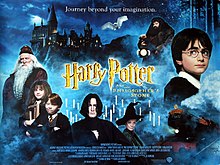
Back ሃሪ ፖተር ክፍል አንድ (ፊልም) Amharic Harry Potter and the Philosopher's Stone (cinta) AN هاري بوتر وحجر الفلاسفة (فيلم) Arabic هارى بوتر وحجر الفيلسوف ARZ Harri Potter və Fəlsəfə Daşı (film) Azerbaijani Haris Puoteris ė Išmintėis akmou (kins) BAT-SMG Гары Потэр і філасофскі камень (фільм) Byelorussian Хари Потър и Философският камък (филм) Bulgarian হ্যারি পটার অ্যান্ড দ্য ফিলোসফার্স স্টোন (চলচ্চিত্র) Bengali/Bangla Harry Potter i la pedra filosofal (pel·lícula) Catalan
| Harry Potter and the Philosopher's Stone | |
|---|---|
 Theatrical release poster | |
| Directed by | Chris Columbus |
| Screenplay by | Steve Kloves |
| Based on | Harry Potter and the Philosopher's Stone by J. K. Rowling |
| Produced by | David Heyman |
| Starring | |
| Cinematography | John Seale |
| Edited by | Richard Francis-Bruce |
| Music by | John Williams |
Production companies | |
| Distributed by | Warner Bros. Pictures[2] |
Release dates |
|
Running time | 152 minutes[3] |
| Countries | |
| Language | English |
| Budget | $125 million[5] |
| Box office | $1.024 billion[5] |
Harry Potter and the Philosopher's Stone (also known as Harry Potter and the Sorcerer's Stone in the United States) is a 2001 fantasy film directed by Chris Columbus and produced by David Heyman from a screenplay by Steve Kloves. It is based on the 1997 novel Harry Potter and the Philosopher's Stone by J. K. Rowling. It is the first instalment in the Harry Potter film series. The film stars Daniel Radcliffe as Harry Potter, with Rupert Grint as Ron Weasley, and Emma Watson as Hermione Granger. Its story follows Harry's first year at Hogwarts School of Witchcraft and Wizardry as he discovers that he is a famous wizard and begins his formal wizarding education.
Warner Bros. Pictures bought the film rights to the book in 1999 for a reported £1 million ($1.65 million). Production began in the United Kingdom in 2000, with Columbus being chosen to helm the film from a short list of directors that included Steven Spielberg and Rob Reiner. Rowling insisted that the entire cast be British and Irish, with the three leads chosen in August 2000 following open casting calls. Filming took place at Leavesden Film Studios and historic buildings around the United Kingdom from September 2000 to March 2001.
Harry Potter and the Philosopher's Stone was released to cinemas in the United Kingdom and Ireland on 10 and 11 November 2001 for two days of previews. The film opened on 16 November in the United States, Canada, and Taiwan as well as officially in the United Kingdom and Ireland. It became a critical and commercial success, grossing $974 million at the worldwide box office during its initial run, and over $1 billion with subsequent re-releases. It became the highest-grossing film of 2001 and the second-highest-grossing film at the time. The film was nominated for many awards, including Academy Awards for Best Original Score, Best Art Direction and Best Costume Design. It was followed by seven sequels, beginning with Harry Potter and the Chamber of Secrets in 2002 and ending with Harry Potter and the Deathly Hallows – Part 2 in 2011.
- ^ a b c d Cite error: The named reference
BritishCouncilwas invoked but never defined (see the help page). - ^ Cite error: The named reference
AFIwas invoked but never defined (see the help page). - ^ Cite error: The named reference
BBFCwas invoked but never defined (see the help page). - ^ Cite error: The named reference
BFIwas invoked but never defined (see the help page). - ^ a b Cite error: The named reference
BOMwas invoked but never defined (see the help page).